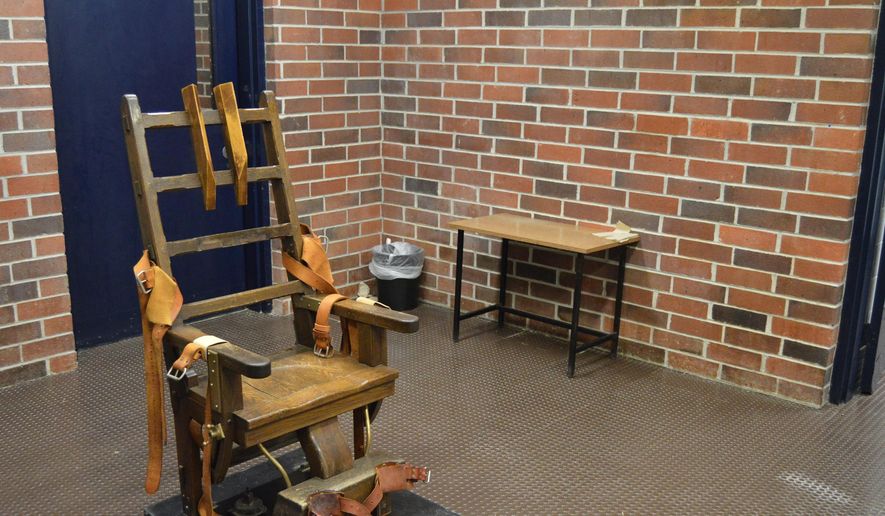Activists and civil rights groups frustrated about the president’s inaction on a key campaign promise are pressuring the Biden administration to end federal executions.
“As the first U.S. president to openly oppose the death penalty and to have campaigned on an anti-death penalty platform, it is disappointing that President Biden has yet to speak publicly on the topic of capital punishment or take any concrete steps to fulfill his promise of abolition,” said Krisanne Vaillancourt Murphy, executive director of the Catholic Mobilizing Network.
The Catholic group and hundreds of other organizations and individuals have sent letters or launched campaigns demanding that Mr. Biden keep his pledge. They include a coalition of former prosecutors and public defenders, a bipartisan group of former prosecutors, attorneys general and retired judges, more than 175 relatives of murder victims, and 80 civil rights groups.
More than 100 days into his presidency, Mr. Biden has remained silent about federal executions — a tentpole of his campaign pledge to reduce racial disparities in the criminal justice system.
In his first week as president, Mr. Biden signed a series of executive orders on racial equity and criminal justice, but a moratorium on federal executions was missing.
The Justice Department has not scheduled any executions, so the 46 prisoners on federal death row are in limbo. Their cases are not moving forward, but the government could put them to death at any time.
It would take legislation from Congress to abolish the death penalty. Still, activists say Mr. Biden could take immediate action, including using his clemency powers and commuting the sentences of federal death row inmates to life in prison.
“The clemency power as an unfettered power would be an act that would certainly signal that [Mr. Biden] doesn’t intend to kick the can down the road,” said Ruth Friedman, the director of the Federal Capital Habeas Project who has represented death row inmates.
However, granting clemency to death row inmates would not stop prosecutors from seeking capital punishment in new cases.
Activists against the death penalty say Mr. Biden would make a strong point with a symbolic gesture to dismantle the death chamber at the federal prison complex in Terre Haute, Indiana.
The president also could order prosecutors to stop pursuing the federal death penalty and direct the Drug Enforcement Administration and the Food and Drug Administration to more strictly regulate the drugs used for lethal injections.
None of that would go far enough to appease activists who fear a repeat of the Obama years. President Obama aired his concerns about the death penalty but stopped short of taking action.
After two high-profile botched executions in 2014, Mr. Obama ordered Attorney General Eric H. Holder Jr. to assess how capital punishment is carried out. The Justice Department never completed the review, and President Trump resumed federal executions after a 17-year hiatus.
The Trump administration executed 13 prisoners in a roughly six-month span, the most by any other administration since 1896.
Ms. Murphy of the Catholic Mobilizing Network said the Trump administration’s numbers highlight the need for Mr. Biden to take bold action.
“After a 17-year ‘de facto’ moratorium on federal executions, they showed how relatively quick and easy it is to restart executions and take the lives of more than a dozen people,” she said.
“Because of this, anti-death-penalty advocates remain steadfast in their witness. There is simply no room to back down. A passive approach to death penalty abolition is not an option. The bloodthirsty example painted by the last administration makes that abundantly clear,” Ms. Murphy said.
Among Mr. Biden’s campaign promises was a pledge to work with Congress to enact legislation that would abolish the death penalty. However, lawmakers appear to have little appetite to advance such a bill.
Rep. Ayanna Pressley, Massachusetts Democrat, sponsored a measure last year to abolish the death penalty. The bill languished. It was reintroduced in January but has not been voted out of a committee.
Sen. Richard J. Durbin, Illinois Democrat, said he planned to introduce a bill in the Senate, but Republicans in both chambers are unlikely to support such measures.
Still, activists remain hopeful. They point to several state-level Republican officials who have turned away from their party’s support of the death penalty.
“I think it will be challenging because we appear to be at a time where consensus and bipartisanship is not the starting point,” said Miriam Krinsky, executive director of Fair and Just Prosecutions. “I would hope there would be a recognition that this is not a liberal or conservative question. The wasted resources and wasted lives are what brings people to the table with a growing consensus.”
Wyoming Gov. Mark Gordon, a Republican, told the state Legislature last year that he was considering a moratorium on capital punishment because of its cost.
In December, Ohio Gov. Mike DeWine, also a Republican, said he declared “an unofficial moratorium” on executions.
The Biden administration must soon confront the issue head-on. The Justice Department needs to decide whether to reinstate the death penalty for Dzhokhar Tsarnaev, the convicted Boston Marathon bomber.
A federal appeals court threw out Tsarnaev’s death sentence last year, but the Supreme Court announced in March that it would review the case.
The Justice Department has until October to decide whether it wants to push for Tsarnaev’s execution, but it could announce that decision much sooner.
“The moment to fish or cut bait is quickly going to be upon the administration whether the advocates put increased pressure on it or not,” Ms. Krinsky said.
• Jeff Mordock can be reached at jmordock@washingtontimes.com.




Please read our comment policy before commenting.